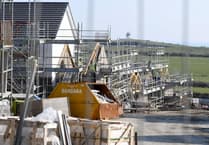A new survey has warned of a dramatic escalation in financial distress among Isle of Man businesses ahead of the planned minimum wage rise to £13.46 next April, with the proportion of firms at high risk of closure increasing more than fourteen-fold.
The Local Economy Forum surveyed more than 90 businesses, employing a combined 3,800 people, during a meeting at the Palace Hotel last week.
Participants were asked to assess how both the current minimum wage of £12.25 and the approved 2026 rate would affect their survival, operating hours, staffing levels, investment and training.
While only one business reported being at high risk of failure at today’s rate, that figure jumped to 14 respondents when asked about the impact of the 2026 wage.
The forum said the trend was similar across other areas, with 57% of respondents reporting a high or severe risk of operational cutbacks and redundancies under the new rate, compared to around 15% under the current one.
More than 70% said they would be forced to cut back on investment and youth employment if the 2026 rise goes ahead, up from under 20% at the existing level.
Forum secretary Brett Martin said the results reflected ongoing pressures on businesses following several years of what he described as ‘cost-push’ inflation.

‘The inflation of the last few years has been “cost-push” inflation through supply disruption from the pandemic and the war in Ukraine,’ he said.
‘It’s not being driven by increased consumer demand, so businesses either absorb the costs through lower margins or pass on the increase and watch their sales volume decline.
‘The result is plain to see in the results of the survey, particularly with a triple-inflation increase in minimum wage coming down the line.’
Mr Martin added that the forum’s preferred model, harmonising the island’s minimum wage with the UK’s and using government-funded tax credits to boost take-home pay, would provide a more balanced approach.
‘You combat cost-push inflation by doing everything you can to dampen price rises and you certainly don’t legislate for 10% wage increases when general inflation is coming under control,’ he said.
‘This is why our take-home proposal would be so economically effective – it would keep the overall increase to sensible levels, but at the same time put more money in the pockets of the low paid to stimulate demand. It should be a no-brainer!’
Forum chairman Chris Robertshaw said government must urgently reconsider its approach.

‘It is both unconscionable and illogical that government should be crushing our local businesses under the weight of an unaffordable minimum wage whilst it sits back, talks about helping the low paid, and skims off 40% of the increase for itself,’ he said.
‘This has gone on long enough and has to change quickly if needless business failures and job losses are to be avoided.’
The survey comes amid growing pressure from hospitality leaders and small and medium-sized firms, who last week jointly called on government to rethink the rise.
The increase to £13.46 in April 2026, a 9.9% uplift, was approved by Tynwald last month despite the Minimum Wage Committee warning it could harm employment and fuel inflation.
Enterprise Minister Tim Johnston defended the approach during the debate, saying it would provide ‘greater clarity and increased notice’ for businesses.
Treasury Minister Dr Alex Allinson said the rise reflected the island’s economic performance and the need to support residents with the cost of living.
Tynwald ultimately voted 17–7 in favour, with the Legislative Council backing it unanimously.
.JPG?trim=0,9,0,7&width=752&height=501&crop=752:501)

.png?width=209&height=140&crop=209:145,smart&quality=75)
-(1).jpeg?width=209&height=140&crop=209:145,smart&quality=75)
